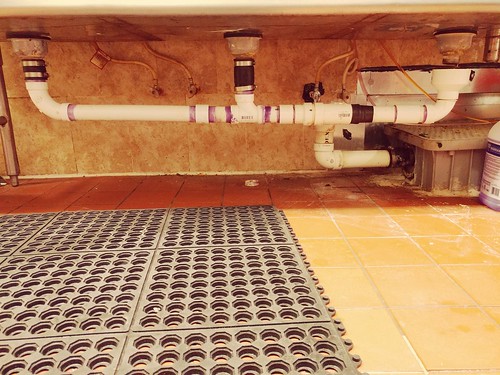Commercial kitchens are the heart of restaurants, hotels, catering businesses, and various food establishments, where precision, efficiency, and cleanliness are paramount. Behind the scenes, an intricate network of plumbing ensures the seamless operation of these kitchens. In this article, we’ll delve into the importance of commercial kitchen plumbing, exploring the unique challenges faced, and the key considerations that contribute to the success of these bustling culinary spaces.
Essential Components of Commercial Kitchen Plumbing:
- Grease Traps: Commercial kitchens generate a significant amount of grease and oil during food preparation. Grease traps are essential components of commercial kitchen plumbing systems, capturing grease and preventing it from entering the drainage system. Regular cleaning and maintenance of grease traps are critical to prevent clogs and ensure smooth kitchen operations.
- Commercial Dishwashers: In a busy commercial kitchen, dishwashers are in constant use. A robust plumbing system is required to handle the high volume of water and detergents used in dishwashing operations. Proper installation, regular maintenance, and addressing leaks promptly are crucial for the efficient functioning of commercial dishwashers.
- Drainage Systems: Efficient drainage is vital in commercial kitchens to handle the constant flow of water and waste. The drainage system should be designed to prevent clogs and backflows, ensuring that water and waste are effectively removed from the kitchen. Regular cleaning and inspections help prevent blockages and maintain optimal drainage.
- Water Supply: Commercial kitchens require a reliable and ample water supply for cooking, cleaning, and other essential tasks. Plumbing systems must designed to meet the specific water demands of the kitchen, ensuring consistent water pressure and temperature. Leaks and water wastage should be promptly addressed to conserve resources.
- Food Preparation Sinks: Sinks used for food preparation play a crucial role in maintaining hygiene in commercial kitchens. These sinks should equipped with proper faucets, sprayers, and drainage systems. Regular cleaning and sanitation of food preparation sinks are essential to prevent contamination and ensure food safety.
- Floor Drains: Commercial kitchens often feature floor drains to handle spills, excess water, and cleaning activities. These drains should strategically placed to facilitate efficient drainage and prevent water accumulation on the kitchen floor. Regular maintenance is necessary to prevent blockages and ensure proper functioning.
Challenges in Commercial Kitchen Plumbing:
- Grease Buildup: Grease is a common challenge in commercial kitchen plumbing. If not properly managed, grease can accumulate in pipes, leading to clogs and backups. Regular cleaning of grease traps and drain lines is crucial to prevent disruptions in kitchen operations.
- High Water Usage: The high water usage in commercial kitchens poses challenges for plumbing systems. Water heaters, faucets, and dishwashers must be designed to handle the constant demand. Regular inspections help identify and address issues related to water pressure, temperature, and efficiency.
- Waste Disposal: Food scraps and waste disposal present challenges in commercial kitchens. Disposal units and drainage systems should equipped to handle food particles without causing clogs. Proper waste disposal practices and routine maintenance are essential to prevent plumbing issues.
- Complex Layouts: Commercial kitchens often have complex layouts with multiple sinks, dishwashing stations, and cooking areas. The plumbing system must designed to accommodate the layout, ensuring optimal functionality and minimizing the risk of leaks or malfunctions.
Key Considerations for Commercial Kitchen Plumbing Success:
- Professional Design and Installation: Successful commercial kitchen plumbing begins with professional design and installation. Working with experienced plumbing professionals ensures that the plumbing system is tailored to the specific needs of the kitchen, considering layout, volume, and usage patterns.
- Regular Maintenance: Regular maintenance is essential for preventing plumbing issues in commercial kitchens. Scheduled inspections, cleaning of grease traps, and prompt repairs contribute to the longevity and efficiency of the plumbing system.
- Emergency Response Plans: Having an emergency response plan in place is crucial for commercial kitchens. Quick access to plumbing professionals who can address urgent issues, such as leaks or clogs, minimizes downtime and ensures uninterrupted kitchen operations.
- Up-to-date Plumbing Codes: Compliance with local plumbing codes is vital for commercial kitchens. Keeping plumbing systems up-to-date with the latest codes and regulations ensures that the kitchen meets health and safety standards.
- Employee Training: Proper training for kitchen staff regarding plumbing practices is essential. This includes educating staff on proper waste disposal, reporting leaks promptly, and understanding basic troubleshooting procedures. Employee awareness contributes to the overall success of the plumbing system.
Conclusion: A Recipe for Plumbing Success
Commercial kitchen plumbing is a critical ingredient in the success of food establishments. From efficient drainage and water supply to managing unique challenges like grease buildup, a well-designed and maintained plumbing system ensures the smooth operation of the kitchen. By considering the specific needs of commercial kitchens, addressing challenges proactively, and implementing regular maintenance practices, businesses can maintain a plumbing infrastructure that supports their culinary endeavors and contributes to a safe and sanitary food preparation environment.

